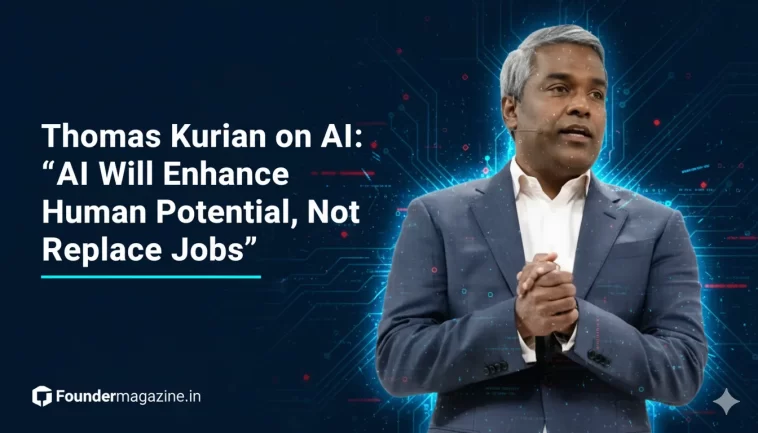The rapid rise of artificial intelligence (AI) has sparked widespread discussions about its impact on employment. Many fear that AI and automation may replace human jobs across industries. In this context, Google Cloud CEO Thomas Kurian offered a reassuring perspective in a recent interview with Big Technology. He emphasized that AI should be seen as a tool to enhance human work, not replace it. His insights shed light on how businesses can integrate AI responsibly while empowering employees.
This article explores Kurian’s statements, real-world AI applications, industry perspectives, and actionable steps for employees and companies to thrive in an AI-driven workplace.
AI as a Tool for Human Empowerment
Kurian’s central message is clear: AI is designed to complement human work, not eliminate it. He explained that AI is most effective at handling repetitive, time-consuming tasks, allowing employees to focus on strategic, creative, and complex problem-solving.
“AI is here to amplify human capability, not replace jobs,” Kurian stated. He highlighted that the right AI tools can free workers from mundane tasks, giving them more time to innovate, engage with clients, and contribute to business growth.
Case Study: Google’s Customer Engagement Suite
Kurian provided a real-world example through Google’s Customer Engagement Suite, an AI-powered platform used by companies to manage customer queries. Contrary to fears that AI would lead to layoffs:
- Companies using this AI did not reduce staff.
- AI handled routine or low-priority inquiries.
- Human agents were able to focus on more complex and high-value issues.
Kurian pointed out that AI is effectively a productivity amplifier, helping employees achieve more without replacing their roles.
How Kurian’s Perspective Aligns with Industry Leaders
Kurian’s views are consistent with other tech executives like Sundar Pichai, Google CEO, who has emphasized AI’s role in boosting human productivity rather than eliminating jobs. Pichai noted that engineers using AI tools experienced a 10% increase in productivity, allowing them to concentrate on creative problem-solving and innovation.
This alignment suggests a broader industry philosophy: AI should augment human work, not supplant it.
AI Applications in Enterprises
Kurian highlighted multiple ways AI is improving workplace efficiency while preserving human roles:
- Customer Support: AI manages initial inquiries, allowing human staff to tackle complex problems requiring empathy and judgment.
- Data Analysis: AI processes large datasets quickly, providing insights that humans can interpret strategically.
- Process Automation: Routine tasks like reporting, scheduling, and inventory management are handled efficiently by AI.
- Enterprise Tools: Platforms such as Gemini Enterprise integrate AI with existing systems, providing real-time assistance and analytics for employees.
These examples demonstrate that AI can enhance productivity and employee focus while reducing burnout from repetitive work.
Addressing Employee Concerns About AI
Despite the benefits, Kurian acknowledged the anxiety surrounding AI and job security. Many workers fear that automation could replace their roles. He recommended a human-centric approach to AI adoption:
- Upskilling Employees: Offer training to help staff use AI tools effectively.
- Collaboration Between AI and Humans: Design workflows where AI supports human decision-making.
- Transparency: Communicate clearly about AI’s purpose and impact on roles.
Kurian believes that by implementing these strategies, AI can create new opportunities instead of reducing jobs. Companies can expand the scope of work and introduce roles that previously did not exist.
AI’s Role in Workforce Evolution
AI adoption is reshaping employment across sectors. While some companies have implemented layoffs due to automation, Kurian emphasizes a balanced, thoughtful integration of AI:
- Productivity Gains: Employees can complete tasks faster and more accurately.
- Innovation Enablement: Freed from repetitive work, employees can focus on creativity and strategy.
- Job Evolution: AI creates new roles in areas such as AI operations, data analysis, and AI ethics.
- Workforce Adaptation: Employees who reskill and collaborate with AI remain competitive and valuable.
The future of work, according to Kurian, relies on human-AI collaboration.
Gemini Enterprise: Empowering Employees with AI
Kurian discussed Gemini Enterprise, Google’s AI platform for businesses. It demonstrates AI’s role in supporting employees rather than replacing them:
- Provides real-time insights to improve decision-making.
- Suggests task prioritization, optimizing workflows.
- Handles repetitive tasks, allowing humans to focus on strategy and innovation.
Gemini Enterprise reflects Kurian’s philosophy: AI works best as a partner to humans, enhancing productivity and creativity.
Balancing AI and Employment
Kurian encourages companies to adopt strategic AI integration:
- Invest in Training: Equip employees with skills to leverage AI effectively.
- Start Gradually: Begin with simple AI applications before scaling.
- Focus on High-Value Work: AI should automate low-value tasks.
- Monitor Impact: Continuously evaluate AI’s effect on productivity and employee engagement.
By following these steps, businesses can benefit from AI without compromising their workforce.
The Broader Picture: AI and Jobs
AI is transforming industries, but Kurian emphasizes that it should empower rather than replace human talent. Experts note that while some roles may evolve, AI adoption creates opportunities in:
- AI-assisted decision-making
- Innovation and creative roles
- Data analysis and operational support
- New career paths in AI-related fields
Kurian’s approach reflects a future where technology and humans collaborate, creating a productive, innovative, and resilient workforce.
You Might Also Like This:
Conclusion
Thomas Kurian’s message is clear: AI will not take your job — it will help you perform it better. By amplifying human potential, AI allows employees to focus on strategic, creative, and meaningful work, while companies benefit from enhanced efficiency and innovation.
For businesses, this means adopting AI responsibly and thoughtfully. For employees, it is a call to upskill, embrace AI tools, and collaborate with technology to unlock new opportunities. Kurian’s insights offer a reassuring and practical vision of a future where AI enhances, rather than replaces, human potential.


